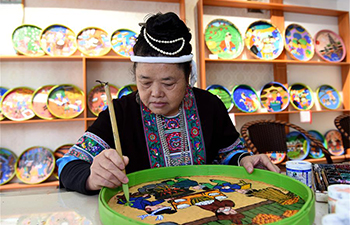
A person receives a free HIV test during the World AIDS Day activities in Kigali, Rwanda, on Dec. 1, 2017. The Rwandan ministry of health on Friday held a ceremony to mark the World AIDS Day, expected to scale up voluntary testing as part of efforts to stem new infections. (Xinhua/Gabriel Dusabe)
KIGALI, Dec. 1 (Xinhua) -- Rwanda on Friday introduced oral HIV testing kit at a ceremony to mark the World AIDS Day, expected to scale up voluntary testing as part of efforts to stem new infections.
The Rwandan ministry of health held the ceremony at Petit Stade Amahoro stadium in the capital city Kigali dubbed "Get tested for HIV. If positive, Start and Stay on life-saving treatment."
The new oral HIV self-testing method was demonstrated by members of Rwanda Medical Students Association before the public.
The oral HIV self-testing tool is an innovative approach that could scale up HIV testing services, particularly among the youth and other high risk populations such as commercial sex workers, Josue Ukuri, the head of the association, introduced the kit at the ceremony.
With the kit, people can use oral fluid or blood-finger-pricks to test in a private and convenient setting. Results will be shown within 20 to 40 minutes. HIV positives already on antiretroviral drugs are not advised to use the oral test as they can be misled because the results turn out negative due to exposure to medication,
Speaking at the event, Rwandan Minister of Health Diane Gashumba said the new self-testing device will play a key role in ending the HIV epidemic in the country, she said.
She encouraged Rwandans most especially the youth to go for HIV testing to know their status.
As part of activities to mark the day, the ministry of health also launched three-month HIV awareness program and as well scaling up on condom kiosks across the country.
At the ceremony, condoms and other HIV preventive materials were freely distributed to the participants and hundreds of people voluntarily participated in HIV testing.
HIV prevalence rate in Rwanda is still at 3 percent since 2005 and this has been achieved because of the numerous strategies in place, according to Jeanine Condo, director general of Rwanda Biomedical Center (RBC).
HIV preventive and treatment services have been scaled up to more than 90 percent of health facilities across the country, according to RBC.
HIV and AIDS from mother to child transmission has been reduced to less than 2 percent while provision of anti-retroviral treatments reaches to all HIV positive people in need and for free, according to the ministry of health.
The ministry of health, under its 2013-2018 HIV and AIDS Strategic Plan, targets to raise the usage of condoms in non-cohabiting intercourse by 13 percent, increase the fraction of the male adult population that is circumcised from 13 percent to 66 percent and decrease the estimated new infections in children from 1,000 to less than 200 per year.















